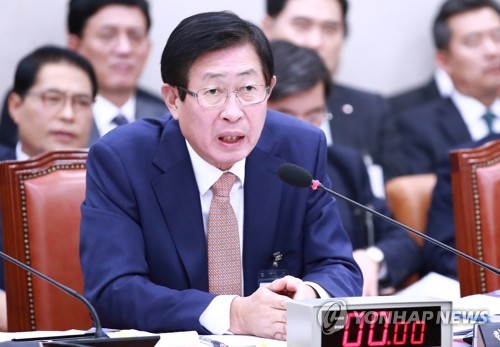The head of the state-run Korea Electric Power Corp. (KEPCO) said Monday that electricity prices are not likely to rise within five years, but it could happen in the long term as the government is set to switch from coal and nuclear to renewable energy.
Since taking office in May, President Moon Jae-in has pledged to phase out nuclear reactors and increase the ratio of renewable energy to 20 percent by 2030.
The government's energy initiative, however, has raised suspicions that reduced dependence on coal and nuclear power and high production costs of renewable energy could lead to higher electricity costs.
"There are not many factors that could push up electricity costs in the next five years," KEPCO CEO Cho Hwan-eik said during a parliamentary audit.
"The new energy mix is not likely to raise electricity bills until 2022 because KEPCO would be able to handle the changing level of the supply and demand."

Cho, however, didn't rule out the possibility of electricity bill hikes in the mid- and long-term, saying: "KEPCO will have to consider it when the eighth electricity supply plan is released... and prepare measures accordingly."
The government has scrapped plans to build six nuclear reactors and temporarily suspended construction of the Shin Kori 5 and 6 units on the southeastern coast for three months. Moon on Sunday, however, decided to accept a public debate commission's recommendation to resume the stalled project.
Cho welcomed the government's decision to resume the construction of Shin Kori reactors, expressing hope for the export market for local reactors.
Currently, KEPCO, which wholly owns the Korea Hydro & Nuclear Power Corp. (KHNP), has been actively trying to make inroads overseas, eyeing nuclear projects in Britain, Saudi Arabia and the Czech Republic.
South Korea operates 24 nuclear reactors that generate about 30 percent of its electricity, while coal and renewable energy provide 37.5 percent and 6.7 percent, respectively, according to the Ministry of Trade, Industry and Energy.
Following the closure of the nation's oldest reactor in May, the government will push for the early closure of Wolsong-1, now the nation's oldest reactor. The nation's 10 oldest reactors will be retired by 2030 as their operational life cycles expire one by one.
While permitting the ongoing construction of five coal plants, the energy ministry earlier said it won't authorize new licenses and will consult with utility companies to convert their coal power projects to natural liquefied gas.

